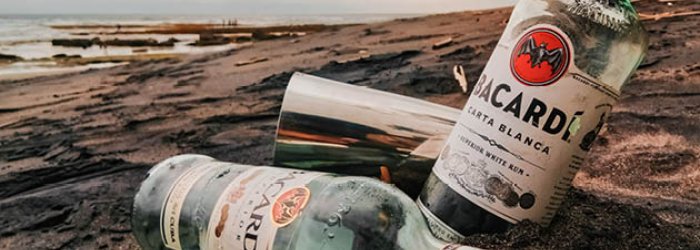General information about Bacardi rum
The Bacardi distillery was founded by Facundo Bacardí i Massó in Santiago de Cuba in 1862. Since its foundation, the distillery has been producing rum with a smooth and light-hearted taste. The sophisticated recipes, which differ from variety to variety, contribute to the smooth and carefree taste of Bacardi.
The Bacardi Carta Blanca, which is surprisingly mild compared to other white rums, is distilled no less than four times to achieve a high level of purity. Carta Blanca is also filtered five times over charcoal before maturing for a year in a barrel. The white rum is therefore a symbol of the elaborate production process behind most types of Bacardi rum.
In the production of Bacardi, sugar cane forms the basis of the rum, as is obligatory for rum production. To be precise, Bacardi, like most internationally renowned rum producers, does not make its rum directly from sugar cane juice, but from molasses. Molasses is a by-product from the processing of sugar cane into sugar.
Bacardi production facilities
Bacardi operates several production facilities worldwide, with the largest distillery in Puerto Rico playing a central role. This plant is an important production site for Bacardi and makes a significant contribution to the production of the popular rum. Not only is Bacardi rum produced in large quantities in Puerto Rico, but the rum is also bottled for many international markets.
In addition to Puerto Rico, Bacardi has other production facilities in Mexico and Italy that complement the brand's global capabilities and ensure that Bacardi can offer its rum in high quality and quantity worldwide. These sites are critical to Bacardi's international expansion and its position as one of the world's leading rum producers.
Legal dispute over Havana Club - Bacardi vs. Pernod Ricard
The legal dispute over the ‘Havana Club’ brand between Bacardi and Pernod Ricard is one of the most famous and long-running conflicts in the spirits industry. Bacardi acquired the rights to the Havana Club brand in 1994, which was previously controlled by the Cuban government, leading to legal disputes with Pernod Ricard, which distributed the brand outside Cuba. The dispute primarily centres on the origin and trademark rights of the iconic rum brand, which is both a symbol of Cuban rum tradition and a major player in the global market.
Despite multiple court battles and the complexity of the case, the legal dispute over Havana Club remains a significant chapter in the history of the international spirits markets. Bacardi and Pernod Ricard have different positions on the ownership of the global distribution and brand identity of Havana Club. This dispute has influenced the perception of the brand and drawn attention to the legal challenges in international trade mark law.
Women at Bacardi - influence and significance for the company's history
Women have played an important role in the history of Bacardi and have contributed significantly to the company's success. Even in the early years of the distillery, Doña Amalia Bacardí, the wife of Facundo Bacardí, was an important supporter of the company and contributed to the development and expansion of the brand. Today, women hold various management positions at Bacardi and are committed to innovation, sustainability and the continuous improvement of products and processes.
The importance of women at Bacardi is reflected not only in the company's history, but also in its future. By promoting diversity and equality within the organisation, female managers are encouraged to contribute their ideas and visions. Bacardi thus emphasises the important role of women and underlines their positive influence on the company's development and the global spirits industry.
Sustainability at Bacardi - commitment to the planet and people
Bacardi is actively committed to sustainability and protecting the environment. The company has launched numerous initiatives to reduce its CO2 emissions, minimise water consumption and reduce waste. Bacardi uses sustainable materials for its packaging and is working to make the entire production process more resource-efficient. Another important step is the use of renewable energy in the production facilities in order to minimise the ecological footprint.
In addition to its environmental protection work, Bacardi is also committed to social responsibility and focusses on fair working conditions and supporting communities in the production regions.
Bacardi in pop culture - Caribbean flair and global presence
In pop culture, Bacardi is inextricably linked with Caribbean island flair and is often associated with white sandy beaches, turquoise seas and a relaxed lifestyle. In advertising campaigns, the iconic Bacardi island is used as a symbol of the exotic Caribbean experience, emphasising the strong brand identity of the spirits brand.
Through numerous mentions in music, films and TV series, Bacardi has established its presence globally and is now seen not only as a synonym for high-quality rum, but also for a lifestyle full of adventure and freedom.






































 Login with Amazon
Login with Amazon